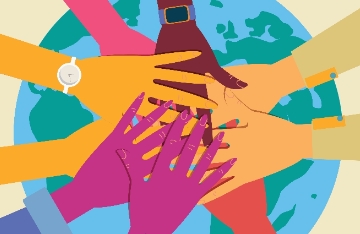The Role of Moral Values in the Journey Toward the Essence of Humanity
It is widely acknowledged that the family constitutes the primary unit of education for children. The moral foundation that shapes an individual's future values and guides their behavior is largely established during early childhood. However, once children reach school age, additional influences emerge. The child becomes a student, and the learning process expands to include diverse methods—such as peer learning—and is enriched by interactions with various individuals within the school environment. During this period, the emphasis often shifts from academic knowledge to teaching societal roles, norms, cultural habits, cooperation, sharing, and personal responsibility.
Parental expectations tend to reflect this shift. However, in recent times, certain segments of society have moved to extremes. The traditional perspectives on life, values passed down through generations, and our relationship with material realities have undergone significant transformations. The educational culture surrounding a student from primary through secondary school has increasingly become centered solely on exam preparation. In contrast to older traditions—where parents prioritized raising morally upright individuals by offering guidance on being a "good human being"—today's concerns have largely shifted toward academic performance, competition, and success rankings. As a result, children have become part of a generation that is emotionally detached, excessively self-centered, and unable to engage in empathy, sharing, or meaningful friendships. Peers are perceived as competitors, and knowledge is hoarded rather than shared.
Since many of these children are not entrusted with responsibilities and have their desires fulfilled without delay from an early age, they often lack essential life skills. Some researchers refer to them as “Generation Alpha”—also labeled “Digital Natives” due to their birth into a technologically saturated world.
Contemporary educators are well aware that the future of a nation is shaped by the youth it raises. The children of today are the leaders of tomorrow. Therefore, the current situation—if not addressed with care and depth—poses a significant threat and will likely become more complex and alarming in the future.
This challenge centers not merely on academic development, but rather on character formation: instilling value systems, offering long-term vision, setting meaningful goals, and ultimately raising individuals who are morally grounded. In an era marked by global crises—ranging from hunger and displacement to environmental disasters and climate change—it is vital to raise children with a heightened awareness of human values. The goal should be to cultivate minds and hearts that prioritize compassion, initiative, and a sense of responsibility.
As modern society drifts away from foundational moral values, perhaps the only solution lies in guiding children back to their inherently pure nature, surrounding them with an ethical framework. One of the most urgent responsibilities of educators is to acknowledge this moral crisis and commit to resolving it through deliberate and persistent efforts.
An additional challenge educators face is involving parents in this transformative process. Many parents equate the well-being of their children solely with material and worldly happiness. However, it is essential to help families recognize that achieving true happiness also necessitates teaching values such as love, respect, justice, responsibility, and—above all—creating an environment rooted in compassion, patience, gratitude, and trust in a higher moral order.
The greatest service educators can offer is to reintroduce children to what is genuinely “normal.” This includes helping them understand their nature and temperament, exposing them to role models from our rich civilization, and instilling the idea that our humanity is defined by our moral and ethical virtues.
This pedagogical endeavor requires a multidimensional approach: integrating both Eastern and Western knowledge traditions, applying ethical principles to daily life, establishing interdisciplinary links, and cultivating an aesthetic sensibility. Furthermore, teaching social etiquette, imparting daily life skills, and nurturing deep interpersonal relationships are crucial. However, unless families actively participate in this effort, it is unlikely that these qualities will be fully internalized by the child. Therefore, parental guidance, practicing school-based values at home, and serving as consistent role models are indispensable.
Though challenging, this process promises rewarding outcomes when approached with care and consistency. In this context, the role of educators is undeniably demanding. Yet the reward—the embodiment of noble behavior in children and the hope that such virtues will gradually influence broader society—makes the effort profoundly worthwhile.
Ultimately, the foremost duty of educators is to recognize moral values as the cornerstone of child development and to shape their educational roadmaps accordingly, ensuring that each step is guided by ethical integrity and long-term human flourishing.
Fatih Nida Üye
